Interesting United States President Facts Part 2 (13th-24th President)
This is a continuation of the four part “Interesting U.S. President Facts” series. If you’re interested in the other parts, you can find them here: Part 1, Part 3, Part 4.
Fillmore was the first President to have running water in the White House.
While touring Europe later in life, the University of Oxford offered him an honorary Doctor of Civil Law degree, which he refused, stating that he had not achieved the necessary “literary nor scientific attainment” for such a degree, and “lacked the benefit of a classical education”. He further went on to state that he could not read the Latin the diploma was written in and “no man should accept a degree he cannot read”.
Fillmore was Vice President when Zachary Taylor died suddenly. Upon his taking over the Presidency, his entire cabinet resigned. Fillmore had very different political ideologies than Taylor, many of which made him a controversial new head of the Whig Party. It wasn’t long after Fillmore’s presidency that the Whig Party broke up, with many Whigs joining the new Republican Party. Fillmore was not one of them, instead joining the “Know Nothing” Party and running for President under that ticket in 1856, but only garnering 21.6% of the popular vote and 8 electoral votes.
Fillmore died on March 8, 1874 shortly after having a stroke. His last words were supposedly “the nourishment is palatable”, referring to soup someone was feeding him after his stroke.
Just a few months before taking the office of the Presidency, Pierce and his wife had to watch their third born child, Benjamin, the only one to live past 4 years old, crushed in a train accident after the train they were on derailed and rolled down a hill in Andover, Massachusetts. The boy was 11 years old. Pierce’s wife blamed Pierce for the accident, believing it was God punishing him for taking such a high office. Their relationship deteriorated from there and this event probably contributed to Pierce’s alcohol problem. He later died of cirrhosis of the liver.
At the time of his inauguration, Pierce was the youngest President to ever hold the office, at just 48, beating out the previous record of 49 held by Polk.
Pierce was the first President to choose to “affirm” his oath of office, rather than swear it. He also was the first to swear upon a book of law, rather than a Bible. On top of that, his inaugural address was unique in that he was the first President to do his entire speech from memory.
The primary slogan during Pierce’s campaign for the Presidency was “We Polked you in 1844; we shall Pierce you in 1852!” Yep…
Often listed as the worst President in U.S. history, Buchanan was eventually disliked even by his own party for his unwillingness to take a stand on anything, often creating compromises that both major parties disliked. This was more significant than it would have otherwise been because of the eminent threat of the South seceding from the United States. As an example of his “fiddling while Rome burns” tendencies, he felt that seceding from the Union was against the law, but that it was also against the law to go to war to stop the secession. As he often stated “I acknowledge no master but the law”, there wasn’t much he felt he could do, other than propose various compromises.
Because he never married (the only President to be a lifelong bachelor) and lived with William Rufus King (Vice President under Franklin Pierce) for 15 years before King died shortly after Pierce became President, this caused many in his day (and now) to think he was perhaps gay. It also caused Andrew Jackson to give King the nickname “Miss Nancy”. King was also sometimes referred to as “Buchanan’s wife” by political opponents.
However, Buchanan was engaged once, but his fiancée Ann Caroline Coleman died. Very shortly before her death, possibly from an overdose of laudanum, Coleman broke off the engagement, believing Buchanan to be uninterested in her thanks to tabloid insinuations that he was only marrying her for her wealthy family and that he was having liaisons with other women. After learning of Coleman’s death, Buchanan wrote to her father and stated, “I may sustain the shock of her death, but I feel that happiness has fled from me forever.”
He was later intimately connected with Mary K. Snyder, even going so far as stating he thought they’d get married, but it never came about. As to his living with King, he explained in a letter that has survived that he felt no person should live alone and times when King was absent for extended periods, he often sought other housemates to fill the void in his home.
While he was President, Buchanan’s adopted niece (her parent’s had died, so he adopted her) took over the duties that would normally have gone to the President’s wife.
Before his Presidency, Buchanan turned down a seat in the Supreme Court. He also firmly resisted being nominated by the Democratic Party for President, intending to retire when he returned from England, where he was at the time when his nomination was decided. He was aware of this, and wrote letters stating that he would refuse the appointment if he was nominated, though he did not do so obviously.
While Lincoln is rightly almost universally considered the greatest of all U.S. Presidents, he also had his share of blemishes, which you’re probably more likely not to have heard of, so those are the things I’ll cover here. For instance, Lincoln’s wife is known to have accepted money in exchange for Lincoln appointing certain people to various positions. Lincoln often lamented his wife doing this, but was apparently powerless to stop her; more to the point, he went ahead and gave out the positions as she requested.
More scandalous than this, and very controversial in his day (as it was more recently when Bush did it), was that Lincoln suspended Habeas Corpus. It was then decreed that anyone “engaged, by act, speech, or writing, in discouraging volunteer enlistments, or in any way giving aid and comfort to the enemy, or in any other disloyal practice against the United States” could be arrested and tried by a military tribunal. This was extremely controversial, particularly from that last bit “any other disloyal practice against the United States”. With this, if you simply criticized the President or the U.S., you could be arrested. For instance, one man was arrested by Union General Henry Halleck for stating, “I wouldn’t wipe my ass with the stars and stripes!”, but otherwise committed no crime.
In total, an estimated 15,000 civilian U.S. citizens were arrested and held. Some were eventually given trials, but not in front of a civil court; they were tried in front of a military tribunal. These arrests drastically dropped after it was determined a month after Lincoln made his decree that the police and military were arresting far too many people who posed no threat and had committed no crime. However, the agents were simply told to use more discretion when making arrests; Lincoln did not undo his suspension of Habeas corpus and the unjust arrests continued, albeit at a slower pace.
Lincoln did, however, stipulate that no one could be put to death for treason without his say-so. Many would have been executed for treason without cause had it not been for him pardoning them. Most, however, were simply given time in prison or sentenced to hard labor, often for committing no actual crime.
Another little known Lincoln fact involves his beard. You’ll note in pre-Presidential photographs, he doesn’t have one. He grew one after an 11 year old girl, Grace Bedell, wrote him a letter and suggested that “if you let your whiskers grow, I will try and get the rest of them [her family] to vote for you. You would look a great deal better for your face is so thin. All the ladies like whiskers and they would tease their husbands to vote for you and then you would be President.” Lincoln responded to her letter and while he didn’t say he was going to grow a beard, within weeks of reading the letter, Lincoln had grown his now famous beard. He later met Bedell and said, “Gracie, look at my whiskers. I have been growing them for you.” Bedell states he then kissed her and walked away, which was the only time she got to meet him in person.
Yet another little known Lincoln fact is that he once was the co-owner of a saloon called “Berry and Lincoln”.
If you believe an account of two of his close friends, Joshua S. Speed and William Herndon (the latter of which was his law partner), Lincoln also occasionally visited prostitutes before he was married and also for a time thought he’d contracted syphilis from doing this. Visiting prostitutes wasn’t that uncommon for the day, but nevertheless against the grain of the “perfect man” image touted after his death. However, even during his liaisons, he apparently was honest as ever. During one instance, he only had $3, but the woman charged $5. She said she’d trust that he’d pay the balance when he could, but he wasn’t so sure of his ability to do so, and didn’t want to short change her if he was later unable, so got back dressed, much to the surprise of the woman.
Another little known Lincoln fact is that he established the Secret Service on the day he was assassinated. You can read more about this here.
Johnson was the first U.S. President to be impeached. He ended up very narrowly being acquitted, by just 1 vote shy of the 2/3’s majority needed to convict him.
Unlike many Presidents who were born to wealthy families or married into them, Johnson was born very poor, after his father died trying to rescue three people from drowning.
Before getting into politics, he was a tailor. He was also mostly self educated outside of learning to become a tailor, including teaching himself how to read and write. He later had his reading and writing skills improved, as well as learned mathematics, from his 16 year old wife, who was the daughter of a shoe maker. He met her after running away from his tailor apprenticeship and establishing his own shop.
Grant’s real name was actually Hiram Ulysses Grant, but he was mistakenly entered into West Point as “Ulysses S. Grant from Ohio” by the person who nominated him, Congressman Thomas L. Hamer. Grant liked the name, though, as it gave him the initials “U.S.”, which ultimately garnered him the nickname “Sam”, after “Uncle Sam“.
Grant is the first President known to have died of cancer. He died of throat cancer, having smoked an estimated 20 cigars per day throughout much of his adult life. He was even sent over 10,000 cigars during his later military career by well wishers who knew he liked cigars.
Unlike most, Grant attempted to run for a third term as President, but failed to be nominated. After his Presidency, thanks to some bad business dealings, Grant found himself deeply in debt, but managed to pull out of it, and with the help of Mark Twain and some clever marketing Twain thought up, Grant’s widow earned nearly half a million dollars (about $10M today) in royalties from Grant’s memoirs, which he finished only a few days before his death.
Grant’s last words were “I hope that nobody will be distressed on my account.”
Hayes won the Presidency via the Compromise of 1877. He had not actually won the popular vote, and possibly didn’t even win the Electoral College. There were 20 disputed votes thanks to voter fraud and close voting numbers, with the tally before the disputed votes at 184 to Tilden and 165 to Hayes. Hayes needed all 20 to win the Presidency, and Tilden needed just 1.
Despite this, an “independent” commission, thanks to 8 votes from Republicans, awarded all 20 electoral votes to Hayes, giving him the Presidency. Naturally, this didn’t sit well with the Democrats, but a compromise was eventually worked out where Hayes would get the Presidency, if Hayes would agree to end the military’s occupation of certain states in the South, which allowed the Democrats to take back control of those states.
Hayes died from complications due to a heart attack. His last words were, “I know that I’m going where Lucy is.” (His wife Lucy had already died.)
Due to being extremely poor thanks to his father’s untimely death when James was just 17 months old, Garfield worked a variety of odd jobs to help support himself during his education, including working as a janitor, a carpenter, and a bell ringer. Shortly after graduating from seminary, he took a position as a teacher and later sought higher education, attending Williams College. He then worked as a preacher, a principal of a high school, and a teacher of classical languages, before getting into law and then politics.
Garfield was also extremely poor during his short Presidency thanks to the fact that the President was still expected to pay White House operating expenses out of his own salary (including funding expensive state dinners and the like; this was partially how Thomas Jefferson had accrued so much debt in his lifetime).
As most Presidents were independently wealthy, this was not usually a problem. Garfield was not in any way wealthy, and even had to borrow a horse and buggy from former President Hayes to get around.
Garfield was the second President to be assassinated, though he did live for 80 days after being shot. He developed a severe infection from the gunshots, with a contributing factor possibly being several doctors who stuck their unsterilized fingers in one of the bullet holes to try to find the bullet lodged deep in Garfield’s body. His health gradually deteriorated until he finally suffered a heart attack and an aneurysm.
Garfield was nearly assassinated earlier, but the would be assassin, Charles J. Guiteau lost his nerve at first after seeing the President’s grief over his extremely ill wife. After Garfield’s wife recovered somewhat, Guiteau followed through with his plan and shot the President.
Garfield’s last words were, “My work is done.”
Known for his amazing fashion sense, Arthur owned about 80 pairs of pants, which he often liked to change several times a day, depending on where he’d be and what he’d be doing at a particular time.
Gore Vidal said of him, “[Arthur] was the most fastidious and fashionable president.”
Cleveland is the only President to be married while in the White House (the second to be married while President). Before his marriage to 21 year old Frances Folsom Cleveland, the youngest First Lady in history, his sister, Rose Cleveland, performed the duties normally given to the President’s wife.
Before becoming President, Cleveland once worked as a Sheriff in Erie County. Among his other duties he twice functioned as a hangman.
During his time as President, Cleveland secretly had a tumor in his mouth removed. To avoid panic, he did it while supposedly on vacation aboard a cruise ship, with the doctors removing parts of his hard palate and upper left jaw. Thanks to a rubber prosthesis, he was able to continue to speak more or less normally and the slight alteration in his speech and appearance was covered up by a story that he’d had two teeth removed.
Benjamin Harrison was the grandson of former President William Henry Harrison. He is the first President whose voice has been preserved, thanks to a 36 second recording preserved on a wax phonograph cylinder in 1889.
He also is the first President to have electricity in the White House. Harrison’s wife was afraid of the electricity and refused to touch the light switches, thus she often slept with the lights on in her room.
Yep, he’s on here twice. He’s the only President to have successfully been elected in non-consecutive terms. As such, he’s considered to have been the 22nd and 24th President, even though technically it could be argued he should only be counted once when saying “There have been 44 Presidents.” Thus, if we’re being technical, that statement should be “There have only been 43 Presidents”, even though most say it the other way.
If you know any more interesting Presidential facts about any of the above, please leave them in the comments below. You can find facts about the rest of the Presidents here: Part 1, Part 3, Part 4.
| Share the Knowledge! |
|

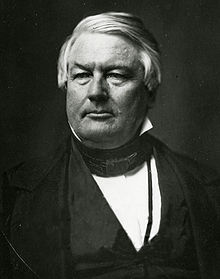
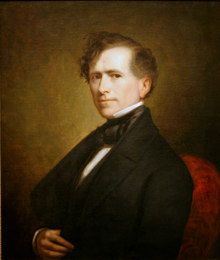
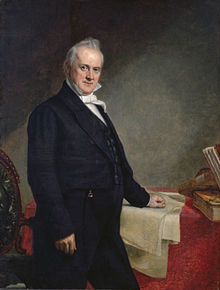
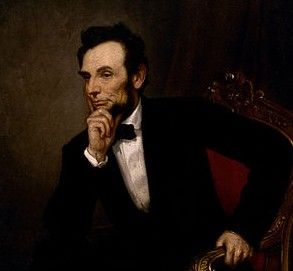
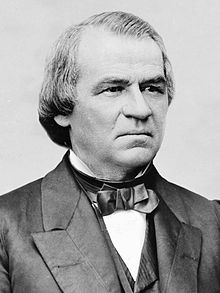
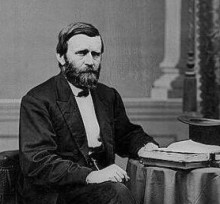
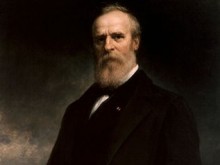
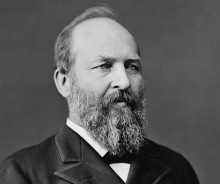
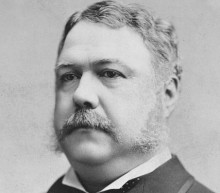
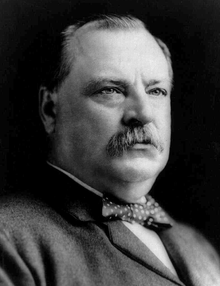
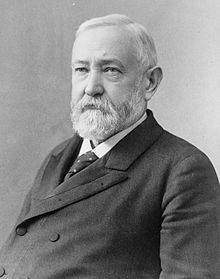
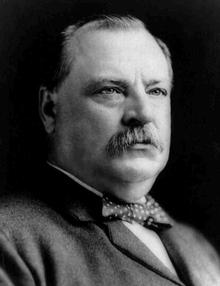




“military career by well wishers who knew he liked cigars.”
He didn’t actually like cigars that much…
“Before the Battle of Fort Donelson, Grant was a light smoker. During the battle a reporter spotted him holding an unlit cigar given him by Admiral Foote, and soon ten thousand cigars were sent to him in camp. Although giving away as many as he could, he started the habit of cigar smoking that became one of his trademarks.”
http://faculty.css.edu/mkelsey/usgrant/facts.html
Had they not sent so many, he wouldn’t have smoked so many.
Apparently Lucy Hayes didn’t approve of drinking and refused to serve alcohol at White House functions. This earned her the nickname, “Lemonade Lucy”.